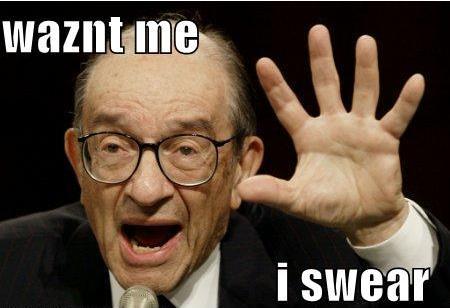Alan Greenspan Says — Not My Fault
Alan Greenspan is one of the most highly respected financial minds in the world. He was Chairman of the Federal Reserve under four consecutive Presidents, and was laughed at when he uttered the words “irrational exuberance” foretelling the eventual collapse of the dot-com bubble.
But even if he was expected to be so by the Presidents he served, he’s not superman. He missed a call, and explained to Congress in Oct 2008 “that we’re not smart enough as people. We just cannot see events that far in advance.”
He’s right, and while I would have suggested some humility about his power while he was in office, I respect that he realized that he doesn’t know everything.
So I was a bit surprised to find out today that he’s got an op-ed in the Wall Street Journal about something he seems very sure of: it wasn’t his fault.
There are at least two broad and competing explanations of the origins of this crisis. The first is that the “easy money” policies of the Federal Reserve produced the U.S. housing bubble that is at the core of today’s financial mess.
The second, and far more credible, explanation agrees that it was indeed lower interest rates that spawned the speculative euphoria. However, the interest rate that mattered was not the federal-funds rate, but the rate on long-term, fixed-rate mortgages. Between 2002 and 2005, home mortgage rates led U.S. home price change by 11 months. This correlation between home prices and mortgage rates was highly significant, and a far better indicator of rising home prices than the fed-funds rate.
…
The Federal Reserve became acutely aware of the disconnect between monetary policy and mortgage rates when the latter failed to respond as expected to the Fed tightening in mid-2004. Moreover, the data show that home mortgage rates had become gradually decoupled from monetary policy even earlier — in the wake of the emergence, beginning around the turn of this century, of a well arbitraged global market for long-term debt instruments.
To some extent, I think what he is saying is correct. There were factors in the economy holding interest rates down and leading to the liquidity glut that we experienced — and some of those factors were outside of the control of the Federal Reserve. But if there were worries about what was going on as early as the middle of 2004, why wasn’t Greenspan on television talking about “irrational exuberance” again?
There were a lot of factors leading up to this. Easy money policies by the fed were one of them. Fannie and Freddie were another. Government endorsement of corrupt ratings agencies that turned crap into AAA bonds played a big part. And the natural belief of the market to believe that the bottom will never fall and keep levering up was a big part of it. Most of those issues were either direct government intervention into the market or an enabling government factor that gave investors and lenders the confidence to overreach.
The structure of our economy incentivized leverage, and I explained a while ago how dangerous excessive leverage can be. At the scale we’ve reached globally, trying to unwind it will be very, very painful. And if anything, you would be expecting the Fed to be standing athwart the trend yelling “STOP”. It’s not like there weren’t warning signs (and doomsayers predicting this eventual end), but the Fed wasn’t paying attention. The guys responsible for it didn’t see it, and if they can’t see it, you wonder what the purpose of having them is at all. For that, I place the blame at the top, on Greenspan.
The problem, as I see it, is that we expect these supposed supermen to be perfect regulators and perfect forecasters of our economy. It’s just not possible. Hayek said it best:
“The curious task of economics is to demonstrate to men how little they really know about what they imagine they can design.”
The problem isn’t that they don’t know. The problem is that we entrust them with power as if we expect them to know.

